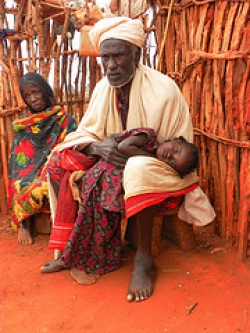 As societies change and the complexity of our world increases, more pressure and strain is put on traditional family structures. However, as these structures crumble, one thing that has not changed is the unbreakable bond between child and grandparent.
As societies change and the complexity of our world increases, more pressure and strain is put on traditional family structures. However, as these structures crumble, one thing that has not changed is the unbreakable bond between child and grandparent.
Increasingly, grandparents all over the world are bringing up their grandchildren, whether it is due to war, famine or disease. Older grandparents are tirelessly embracing this new challenge despite their reduced income, strength and mobility.
In many societies it is the older people who hold together the weakening strands of the family. It is the grandparents who support their children and grandchildren by caring for sick relatives, returning to work to earn an income or giving whatever small pension they have to their families.
Caring for the younger generation
For World Humanitarian Day, this Friday 19 August, I recognise that grandparents are the uncelebrated humanitarians of the new millennium. In many societies and disaster situations, they are expected to care for and nurture the younger generation, as well as pass on their wisdom, skills and traditions.
Working here in Ethiopia, I can see this happening before my very eyes. The worst droughts in 60 years have left millions of people in need. Thousands of people worldwide have supported those without food, water and shelter by giving money or volunteering their time. Humanitarian workers from NGOs and aid agencies are working long hours in difficult circumstances to reduce the suffering of others.
Even in these unbelievably tough circumstances, older people are caring for the younger generation. In the Dollo Ado refugee camps, for example, the relationship between old and young in indisputable. Recognising this special link between children and grandparents, Save the Children and HelpAge are working together to support both age groups.
Supporting both young and old
We will support older people to care for younger, unaccompanied children in the camps. Not only will this cement the connection between the generations, but it also highlights older people’s importance in humanitarian crises.
Older people will receive support in the form of a stipend and the welfare of the unaccompanied children will be monitored. HelpAge and Save the Children are developing a new model of caring for unaccompanied children in refugee camps, not only in Dollo Ado but also in any future humanitarian crisis.
And it all focuses on the crucial care giving role that older people play.
Celebrating grandparents
On World Humanitarian Day let us pause for a moment and celebrate grandparents.
They are the uncelebrated humanitarians of our modern age, playing a fundamental role in society with little resources or help.
We must recognise their contributions and most importantly, support them as grandparents to benefit both them and their grandchildren.
Read more about the drought in Ethiopia
HelpAge’s work is supported by our sister organisation Age UK. Please donate to Age UK’s East Africa appeal for vulnerable older people affected by the devastating drought in Ethiopia.
Age UK is raising money together with the Disasters Emergency Committee (DEC) for the East Africa Crisis Appeal. The DEC is a consortium of 14 aid agencies working together in times of disasters and emergencies.
